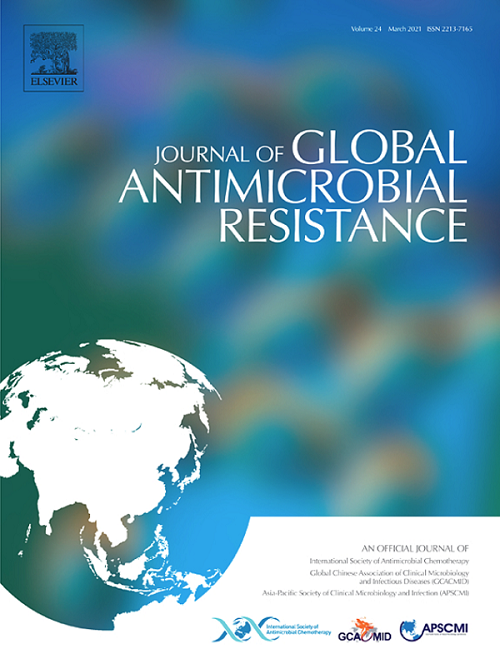Establishing the pivotal role of infectious diseases and clinical microbiology professional societies: A global survey
IF 3.2
3区 医学
Q2 INFECTIOUS DISEASES
引用次数: 0
Abstract
Objective
The role of medical professional societies extends beyond the regulation of medical practice. They also facilitate lifelong learning among healthcare professionals. It is unknown how these societies function across the globe, particularly in the area of infectious disease. This is relevant considering the response to infection emergencies like pandemics and antibiotic resistance. Here, we assess the structure, activities, and involvement of infection-related societies worldwide, with a focus on their engagement in national antimicrobial resistance (AMR) action plans.
Methods
An online survey was distributed in 2024 via the networks of the International Society of Antimicrobial Chemotherapy and the European Society for Clinical Microbiology and Infectious Diseases to national medical societies with a role in infectious diseases. The survey collected data on governance, resources, and AMR-related activities. Responses were analysed using descriptive statistics and categorized by WHO regions and World Bank income classifications.
Results
Eighty-six societies from 62 countries responded. Most had structured governance, paid memberships, and annual work plans. However, 25 societies reported insufficient resources. Societies in low- and middle-income countries were generally younger and smaller. While most societies expressed willingness to contribute to AMR efforts, many were not formally recognized in national AMR strategies. Board governance was largely democratic, though funding and conflict of interest management varied.
Conclusions
Professional societies are underutilized in AMR policy and implementation. Strengthening their governance, resources, and integration into national strategies – especially in low- and middle-income countries – can enhance their impact. International collaboration and mentorship can support capacity building and foster more effective global health responses.
建立传染病和临床微生物学专业学会的核心作用;一项全球调查。
目标:医学专业协会的作用超出了对医疗实践的监管。它们还促进了医疗保健专业人员的终身学习。目前尚不清楚这些社会如何在全球范围内发挥作用,特别是在传染病领域。考虑到对流行病和抗生素耐药性等感染紧急情况的反应,这是相关的。在此,我们评估了全球感染相关协会的结构、活动和参与情况,重点关注它们在国家抗菌素耐药性(AMR)行动计划中的参与情况。方法:于2024年通过国际抗微生物化疗学会(ISAC)和欧洲临床微生物学与传染病学会(ESCMID)网络向在传染病领域发挥作用的国家医学学会进行在线调查。该调查收集了有关治理、资源和amr相关活动的数据。采用描述性统计对反馈进行分析,并按世卫组织区域和世界银行收入分类进行分类。结果:来自62个国家的86个学会做出了回应。大多数都有结构化的管理、付费会员和年度工作计划。然而,有25个社团报告资源不足。低收入和中等收入国家(LMICs)的社会普遍较年轻,规模较小。虽然大多数社会表示愿意为抗微生物药物耐药性的努力作出贡献,但许多社会并没有在国家抗微生物药物耐药性战略中得到正式承认。董事会治理基本上是民主的,尽管资金和利益冲突(COI)管理各不相同。结论:专业学会在抗菌素耐药性政策和实施中未得到充分利用。加强它们的治理、资源和融入国家战略,特别是在中低收入国家,可以增强它们的影响。国际合作和指导可以支持能力建设,促进更有效的全球卫生对策。
本文章由计算机程序翻译,如有差异,请以英文原文为准。
求助全文
约1分钟内获得全文
求助全文
来源期刊

Journal of global antimicrobial resistance
INFECTIOUS DISEASES-PHARMACOLOGY & PHARMACY
CiteScore
8.70
自引率
2.20%
发文量
285
审稿时长
34 weeks
期刊介绍:
The Journal of Global Antimicrobial Resistance (JGAR) is a quarterly online journal run by an international Editorial Board that focuses on the global spread of antibiotic-resistant microbes.
JGAR is a dedicated journal for all professionals working in research, health care, the environment and animal infection control, aiming to track the resistance threat worldwide and provides a single voice devoted to antimicrobial resistance (AMR).
Featuring peer-reviewed and up to date research articles, reviews, short notes and hot topics JGAR covers the key topics related to antibacterial, antiviral, antifungal and antiparasitic resistance.
 求助内容:
求助内容: 应助结果提醒方式:
应助结果提醒方式:


